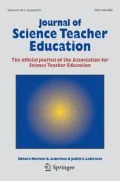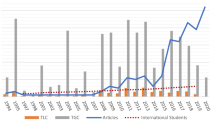Abstract
The manuscript examines the relationship between language, identity, and classroom learning. Through an exploration of a series of research studies conducted over the course of 6 years, this manuscript examines how the idea of “Good Teaching” fails to account for the language-identity learning dilemma. In stage one of the research, a series of studies demonstrated how students encountered cultural conflicts as they attempted to use the language of science. The results of that research lead to the development of the construct of Discursive Identity as a lens to understand language interactions. Stage two of the research involved a series of examinations of alternative approaches to teaching that would assist minority students in their science learning. The implications of this research highlight the relationship between students’ cognition and the sociocultural interaction that effect students’ willingness to engage in academic discourse.
Similar content being viewed by others
Notes
Detailed research methods are available in each of the individual research articles. They are available in the literature review that follows.
References
Agar, M. (1994). Language shock: Understanding the culture of conversation. New York: William Morrow & Co.
Archer, L., Dewitt, J., Osborne, J., Dillon, J., Willis, B., & Wong, B. (2010). “Doing” science versus “being” a scientist: Examining 10/11-year-old schoolchildren’s constructions of science through the lens of identity. Science & Education, 94, 617–639.
Bakhtin M. N (1981). The dialogic imagination: Four essays by M. M. Bakhtin. (M. Holquist, Ed., M. Emerson, & M. Holquist, Trans.). The dialogic imagination. Austin, TX: University of Texas Press.
Baugh, J. (2000). Beyond ebonics: Linguistic pride and racial prejudice. New York, NY: Oxford University Press.
Brickhouse, N. (1994). Bringing in the outsiders: Reshaping the sciences of the future. Journal of Curriculum Studies, 26, 401–416.
Brickhouse, N., & Potter, J. (2001). Young women’s scientific identity formation in an urban context. Journal of Research in Science Teaching, 38, 965–980.
Brown, B. (2004). Discursive identity: Assimilation into the culture of science and its implications for minority students. Journal of Research in Science Teaching, 41, 810–834.
Brown, B. (2005). The Politics of Public Discourse: Discourse, Identity and African-Americans in science education. The Negro Educational Review, 56(2), 205–220.
Brown, B. (2006). It isn’t no slang that can be said about this stuff”: Language, identity, and appropriating science discourse. Journal of Research in Science Teaching, 43, 96–126.
Brown, B. (2008). Assessment and academic identity: Using embedded assessment as an instrument for academic socialization in science education. Teachers College Record, 110, 2116–2147.
Brown, B. (2009). Intellectual innovation or intellectual retrofitting: On agency, culture, and access to science education. Cultural Studies in Science Education, 2, 379–386.
Brown, B., & Kloser, M. (2009a). A view of the tip of the iceberg: Revisiting conceptual continuities and their implications for science teaching. Cultural Studies in Science Education, 4, 921–928.
Brown, B., & Kloser, M. (2009b). Conceptual continuity and accessing everyday scientific understandings. Cultural Studies in Science Education, 4, 875–897.
Brown, B., & Ryoo, K. (2008). Teaching science as a language: A ‘content-first’ approach to science teaching. Journal of Research in Science Teaching, 45, 525–664.
Brown, B., & Spang, E. (2008). Double talk: Synthesizing everyday and scientific language in the classroom. Science & Education, 92, 708–732.
Brown, B., Reveles, J., & Kelly, G. (2005). Scientific literacy and discursive identity: A theoretical framework for understanding science education. Science & Education, 89, 779–802.
Brown, B., Ryoo, K., & Rodriguez, J. (2010). Pathway towards fluency: Using disaggregate instruction to promote science literacy. International Journal of Science Education, 32, 1465–1493.
Coupland, N., & Jaworski, A. (1997). A modern sociolinguistics: a reader and coursebook. New York, NY: St. Martin’s Press.
Eick, C., & Reed, C. (2002). What makes an inquiry-oriented science teacher? The influence of learning histories on student teacher role identity and practice. Science & Education, 86, 401–416.
Erickson, E. (1968). Identity: Youth and crisis. New York, NY: W.W. Norton.
Fang, Z. (2004). Scientific literacy: A systemic functional linguistics perspective. Science & Education, 89, 1–13.
Fang, Z. (2005). Scientific literacy: A systematic functional linguistics perspective. Science Education, 89, 335–347.
Fishman, J. (1997). The sociology of language. In N. Coupland & A. Jaworski (Eds.), Sociolinguistics: A reader and coursebook (pp. 25–30). Hampshire, England: Macmillan Press.
Forbes, C., & Davis, E. (2008). The development of preservice elementary teachers’ curricular role identity for science teaching. Science & Education, 92, 909–940.
Gee, J. (2001). Identity as an analytic lens for research in education. In W. Secada (Ed.), Review of research in education (Vol. 25, pp. 99–125). Washington, DC: American Educational Research Association.
Gilbert, A., & Yerrick, R. (2001). Same school, separate worlds: A sociocultural study of identity, resistance, and negotiation in a rural, lower track science classroom. Journal of Research in Science Teaching, 38, 574–598.
Gumperz, J. (1982). Discourse strategies. Cambridge, UK: Cambridge University Press.
Gumperz, J., & Hymes, D. (1972). Directions in sociolinguistics: The ethnography of communication. New York, NY: Holt, Rinehart & Winston.
Gutierez, K., Baquedano-Lopez, P., & Tejeda, C. (1999). Rethinking diversity: Hybridity and hybrid language practices in the third space. Mind, Culture, and Activity, 6, 286–303.
Helms, J. (1998). Science and me: Subject matter and identity in secondary school science teachers. Journal of Research in Science Teaching, 35, 811–834.
Hymes, D. (1972). On communicative competence. In J. Pride & J. Holmes (Eds.), Sociolinguistics (pp. 52–131). Hammondsworth, Great Britain: Penguin.
Ladson-Billings, G. (1992). Culturally relevant teaching: The key to making multicultural education work. In C. A. Grant (Ed.), Research and multicultural education (pp. 106–121). London, UK: Falmer Press.
Ladson-Billings, G. (1995). But that’s just good teaching! The case for culturally relevant pedagogy. Theory Practice, 34, 159–165.
Lee, O. (2001). Culture and language in science education: What do we know and what do we need to know? Journal of Research in Science Teaching, 38, 499–501.
Lee, O., Dektor, R., Hart, J., Cuevas, P., & Enders, C. (2005). An instructional intervention’s impact on the science and literacy achievement of culturally and linguistically diverse elementary students. Journal of Research in Science Teaching, 42, 857–887.
Lemke, J. (1990). Talking science: Language, learning, and values. Norwood, NJ: Ablex.
Luehmann, A., & Lynn, A. (2007). Identity development as a lens to science teacher preparation. Science & Education, 91, 822–839.
Malone, K., & Barabino, G. (2008). Narrations of race in STEM research settings: Identity formation and its discontents. Science & Education, 93, 485–510.
Marcia, J. E. (1966). Development and validation of ego-identity status. Journal of Personality and Social Psychology, 3, 551–558.
Moll, L., Amanti, C., Neff, D., & Gonzalez, N. (1992). Funds of knowledge for teaching: Using a qualitative approach to connect homes and classrooms. Theory into Practice, 31, 132–141.
Moore, F. (2008). Positional identity and science teacher professional development. The Journal of Research in Science Teaching, 45, 684–710.
Nasir, N. S., & Saxe, G. B. (2003). Ethnic and academic identities: A cultural practice on emerging tensions and their management in the lives of minority students. Educational Researcher, 32, 14–18.
Oliveiera, A., Sadler, T., & Suslak, D. (2007). The linguistic construction of expert identity in professor-student discussions of science. Cultural Studies of Science Education, 2, 119–150.
Proweller, A., & Mitchener, C. (2004). Building teacher identity with urban youth: Voices of beginning middle school science teachers in an alternative certification program. Journal of Research in Science Teaching, 41, 1044–1062.
Reveles, J., Cordova, R., & Kelly, G. (2004). Scientific literacy and academic identity formulation. Journal of Research in Science Teaching, 41, 1111–1144.
Rosebery, A., Warren, B., & Conant, F. (1992). Appropriating scientific discourse: Findings from language minority classrooms. The Journal of Learning Sciences, 2, 61–94.
Roth, W., & Lawless, D. (2002). Science, culture, and the emergence of language. Science & Education, 86, 368–385.
Settlage, J., Southerland, S., Smith, L., & Ceglie, R. (2008). Constructing a doubt-free teaching self: Self-efficacy, teacher identity, and science instruction within diverse settings. Journal of Research in Science Teaching, 46, 102–125.
Steele, C. (1997). A threat in the air: How stereotypes shape intellectual identity and performance. American Psychologist, 52, 613–639.
Varelas, M., Becker, J., Luster, B., & Wenzel, S. (2002). When genres meet: Inquiry into a sixth-grade urban science class. Journal of Research in Science Teaching, 39, 579–605.
Volkman, M., & Anderson, M. (1998). Creating professional identity: Dilemmas and metaphors of a first-year chemistry teacher. Science & Education, 82, 293–310.
Vygotsky, L. (1964). Thought and language. (E. Hanfmann & G. Vakar, Trans.). Cambridge, MA: Massachusetts Institute of Technology.
Wenger, E. (1999). Communities of practice: Learning meaning, and identity. New York, NY: Cambridge University.
Wortham, S. (2003). Curriculum as a resource for the development of social identity. Sociology of Education, 76, 229–247.
Yoder, A. (2000). Barriers to ego identity status formation: A contextual qualification of Marcia’s identity status paradigm. Journal of Adolescence, 23, 95–106.
Author information
Authors and Affiliations
Corresponding author
About this article
Cite this article
Brown, B.A. Isn’t That Just Good Teaching? Disaggregate Instruction and the Language Identity Dilemma. J Sci Teacher Educ 22, 679–704 (2011). https://doi.org/10.1007/s10972-011-9256-x
Published:
Issue Date:
DOI: https://doi.org/10.1007/s10972-011-9256-x




